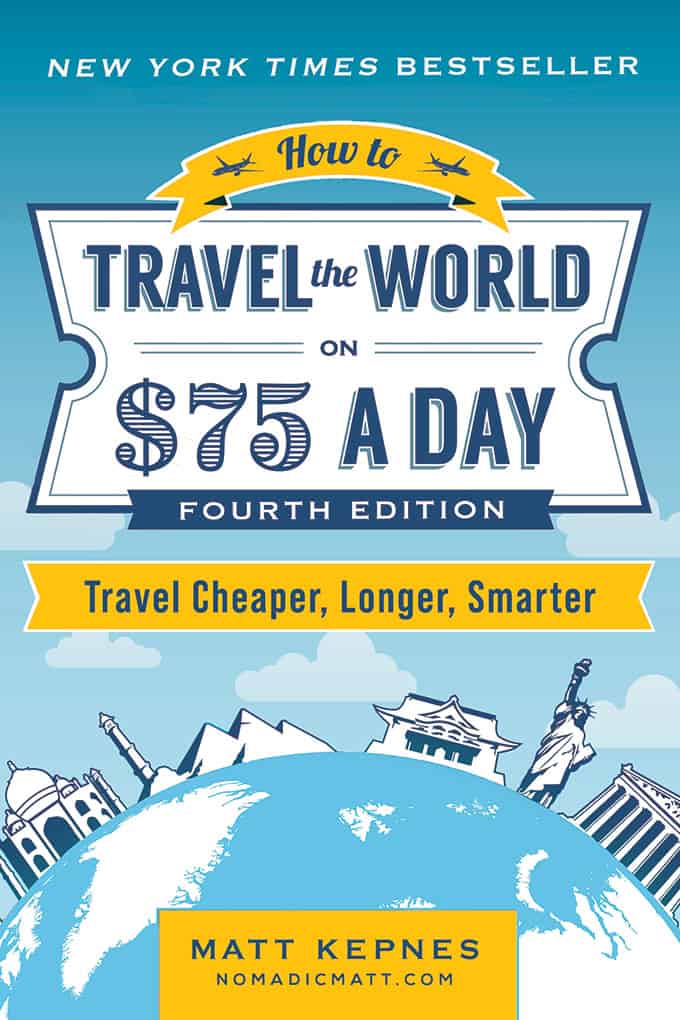
I love hostels. Even after over nineteen years traveling the world, I still stay in hostels because they’re the best way to meet people and the cheapest accommodation option in much of the world.
But what makes a good hostel?
And how do you avoid a bad hostel?
After staying in over a thousand hostels since I first started traveling the world, I’ve become adept at figuring out very quickly if the hostel owners know what they are doing or if they just randomly woke up one day and said, “Let’s open a hostel. It sounds like fun.”
While hostels are all about the people, management can do a few things to make their hostel the perfect framework for making your experience better. Certain features make a hostel memorable (common rooms, group activities, kitchens) while others can make them forgettable — or worse (push-button showers, general filth, unknowledgeable staff).
All of my favorite hostels share common traits that make them some of the best in the world.
Here’s a breakdown of what I would look for in a hostel to help you pick the best one for your next trip:
1. Is There a Common Room?
I love meeting new people when I travel. Since I usually travel solo, I need to go out of my way to meet people if I want to be social. Common rooms in hostels make that easy. They help me find people to chat with, get tips from, do activities with, or even travel with.
Plus, they’re good for just having fun. They usually have pool tables or video game consoles, TVs/movies (perfect for rainy days), foosball, ping pong, and comfy couches (comfy couches are a must!). If you want to be social, make sure you stay somewhere that has a decent common room (or several). It’s the best place to easily connect with other travelers.
In warmer destinations, a common area outside is also a big plus. Rooftop bars, patios, BBQ areas, a pool — any social outdoor space is a must.
2. Is It Centrally Located?
Location, location, location. Whenever I’m looking for a new hostel I make sure that it’s near the things I want to see. I don’t want to spend all my time commuting when I get somewhere new. For that reason, I always make sure my hostels are in a central location and that they’re close to public transportation. That way, I can get around easily and don’t need to worry about having to waste money on taxis.
This is especially important in large cities where things are spread out and when you’re on a shorter trip and time is of the essence. Yes, they might cost more money, but you’ll save money on transportation. Plus, the more centrally-located hostels are usually the more popular ones, making them better places to meet people.
Don’t waste your vacation in transit; book somewhere central!
3. Is It Clean?
Sure, budget travelers like things cheap — but that doesn’t mean we like things dirty. While hostels have come a long way in recent years, there are still many that are poorly maintained and in need of a thorough scrubbing. Since it’s easy to get sick on the road, avoid dirty hostels. Gross bathrooms and showers (as well as the increased risk of bed bugs) aren’t worth the risk — even if the hostel is cheap. Invest in yourself. You deserve a clean room!
Since the photos hostels post on their website and social media can be misleading, make sure to specifically read reviews on sites like Hostelworld for hints on cleanliness. If just one person complains, maybe it’s not a big deal. But if numerous reviews mention the lack of cleanliness, take that as a cue.
4. Did You Read Reviews?
Always read reviews before you book. Is the hostel quiet or noisy? Is it a party hostel or more laid back? Are the mattresses comfy? Are the bunk beds squeaky? You can usually answer all of these questions (and many more) by reading reviews.
Websites like Hostelworld and Booking.com have tons of reviews to help you find the hostel that best suits your needs and budget.
While you’ll want to take them with a grain of salt (people love to complain), they are definitely helpful when it comes to picking the best hostel. Make sure you leave reviews too — good reviews help hostels grow and bad reviews can warn your fellow travelers so they don’t make the same mistake.
Additionally, make sure you only stay at hotels with lots of reviews. A hostel might have a high rating on Hostelworld but if it only has 10 or 20 reviews then I’ll likely stay away from it (it’s easy to fake ratings like that). However, if a hostel has hundreds (or thousands) of reviews and still has a rating of 8 or 9 out of 10 then that’s a good sign it’s a solid place to stay.
Generally, I try to only book hostels with a rating of 8 or higher on Hostelworld.
5. Do they Organize Group Activities?
If you plan on staying at a social hostel and want to meet people, choose a hostel that offers group activities. These could be walking tours (my personal favorite activity), pub crawls, trivia nights, cooking classes, or BBQs. These events are a great way to meet other travelers and learn about your destination.
My favorite hostels are always social hostels that organize events. It just makes your stay much more fun and lively!
6. Is There Late Checkout?
Never stay at a hostel with a checkout time before 10am. The best hostels have 11am checkout times, and the really good ones let you check out at noon. Sleep is valuable on the road because you’ll rarely get enough of it. Hostels with late checkout times understand this and are often more relaxed environments. There’s just something wrong about a hostel asking you to be packed and out so early in the morning.
7. Is There a Bar?
Bars are not deal breakers and there are a lot of wonderful hostels without them, but they make for a great place to socialize with other hostel guests. Usually if a hostel has a bar, they put a strong emphasis on making sure the people staying there are having fun, interacting, and being festive.
If you’re looking to be social and meet people, you’ll want to stay somewhere with a bar.
8. Do They Have Lockers?
It’s surprising, but I’ve actually been in hostels that don’t provide lockers or will charge you for them. In this day and age, lockers should be standard. You should never pay for security. This is a deal-breaker for me (especially since I travel with electronics). Always bring a lock with you as well, so you can use the lockers when they are provided.
9. Is There a Kitchen?
Try to look for hostels with kitchens since you can then prepare your own food, lower your food budget, and share a meal with your new friends. Nothing binds people closer together than a shared meal (and a few glasses of wine).
10. Do They Offer Breakfast?
Look for a place with a decent breakfast (i.e., more than bread and cheese) or at least one that begins and ends when people are actually awake (breakfasts that start around 8:30am usually go late). Breakfast is also a great way to load up on snacks for the day, cutting down your food budget.
11. Do They Have Pod-style Beds?
Gone are the days of sleeping on creaky, metal bunks. Whenever possible, look for a hostel with pod-style beds. These beds provide much better privacy and dampen the noise around you so you can sleep better. They usually have curtains too, which are always a big plus in my book.
12. Are There Individual Lights & Outlets?
Before you book, find out if the dorm bunks have their own outlet and light. Not only will this ensure you can charge your devices without having to fight for space, but it means your fellow travelers can turn on their own small lamp instead of the room’s main light. (I hate it when people turn the lights on in the middle of the night. Use your bed’s lamp or a flashlight!)
I don’t need a hostel to have all these things, but a truly wonderful hostel that understands what travelers are looking for has the majority of the things listed above.
Additionally, as more and more people shift to remote work, hostels have started to accommodate long-term travelers who work on their laptops. If you’re a remote worker, these hostels are great places to stay as they have fast Wi-Fi and make it easy to connect and network with other digital nomads. However, if you’re not working online while traveling, avoid these hostels since most people will just be on their laptops working and that’s kind of boring if you’re not doing it too. Instead, stay at a hostel that caters to backpackers. It will be much more enjoyable and you’ll have an easier time meeting people.
In the end, what really makes a good hostel are the people and even the worst hostels will be great if you meet good people. But removing the people from the equation, I look for hostels that have some of the above qualities in them. Hostels that know what you want as a traveler are there to enhance your travel experience, not simply take money from you in exchange for a bed. I would rather stay at a place that is looking to make sure I have a good time.
How to Travel the World on $75 a Day

My New York Times best-selling book to travel will teach you how to master the art of travel so that you’ll get off save money, always find deals, and have a deeper travel experience. It’s your A to Z planning guide that the BBC called the “bible for budget travelers.”
Book Your Trip: Logistical Tips and Tricks
Book Your Flight
Find a cheap flight by using Skyscanner. It’s my favorite search engine because it searches websites and airlines around the globe so you always know no stone is being left unturned.
Book Your Accommodation
You can book your hostel with Hostelworld. If you want to stay somewhere other than a hostel, use Booking.com as it consistently returns the cheapest rates for guesthouses and hotels.
Don’t Forget Travel Insurance
Travel insurance will protect you against illness, injury, theft, and cancellations. It’s comprehensive protection in case anything goes wrong. I never go on a trip without it as I’ve had to use it many times in the past. My favorite companies that offer the best service and value are:
Want to Travel for Free?
Travel credit cards allow you to earn points that can be redeemed for free flights and accommodation — all without any extra spending. Check out my guide to picking the right card and my current favorites to get started and see the latest best deals.
Need a Rental Car?
Discover Cars is a budget-friendly international car rental website. No matter where you’re headed, they’ll be able to find the best — and cheapest — rental for your trip!
Need Help Finding Activities for Your Trip?
Get Your Guide is a huge online marketplace where you can find cool walking tours, fun excursions, skip-the-line tickets, private guides, and more.
Ready to Book Your Trip?
Check out my resource page for the best companies to use when you travel. I list all the ones I use when I travel. They are the best in class and you can’t go wrong using them on your trip.

